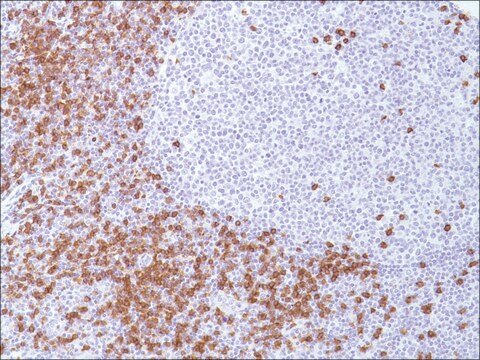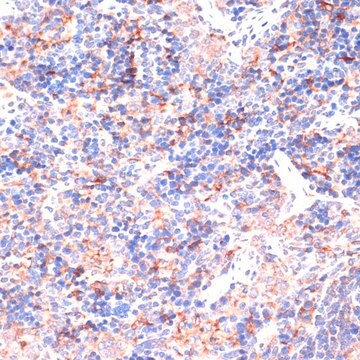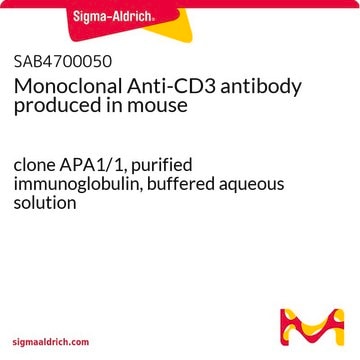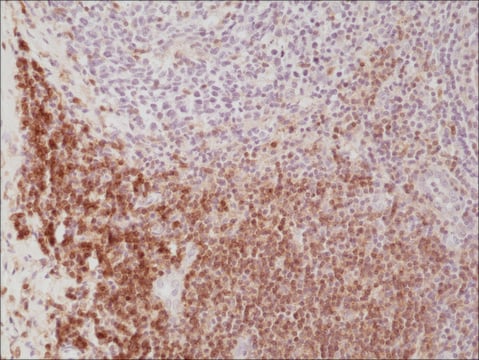SAB5500064
Anti-CD4 antibody, Rabbit monoclonal
recombinant, expressed in proprietary host, clone SP35, affinity isolated antibody
Synonym(s):
Anti-CD4mut, Anti-IMD79, Anti-OKT4D
Sign Into View Organizational & Contract Pricing
All Photos(2)
About This Item
UNSPSC Code:
12352203
NACRES:
NA.41
Recommended Products
biological source
rabbit
Quality Level
recombinant
expressed in proprietary host
conjugate
unconjugated
antibody form
affinity isolated antibody
antibody product type
primary antibodies
clone
SP35, monoclonal
species reactivity
human (tested)
species reactivity (predicted by homology)
pig
technique(s)
flow cytometry: 1:100
immunohistochemistry: 1:50
isotype
IgG
UniProt accession no.
shipped in
wet ice
storage temp.
2-8°C
target post-translational modification
unmodified
Gene Information
human ... CD4(920)
Related Categories
General description
CD4, a single chain transmembrane glycoprotein, is found on a T cell subset (helper/inducer) representing 45% of peripheral blood lymphocytes. It is also present on 80% of thymocytes and at a lower level on monocytes. It is involved in recognition of antigen presented along with MHC class II by APCs. It serves as receptor for HIV and is expressed in T cell lymphomas. Non-specific nuclear staining is sometimes seen in follicles with this antibody; however in most cases it does not interfere with the interpretation of the CD4 membrane staining.
Immunogen
Synthetic peptide corresponding to internal region of human CD4.
Features and Benefits
Evaluate our antibodies with complete peace of mind. If the antibody does not perform in your application, we will issue a full credit or replacement antibody. Learn more.
Physical form
0.1 ml rabbit monoclonal antibody purified by protein A/G in PBS/1% BSA buffer pH 7.6 with less than 0.1% sodium azide.
Disclaimer
Unless otherwise stated in our catalog or other company documentation accompanying the product(s), our products are intended for research use only and are not to be used for any other purpose, which includes but is not limited to, unauthorized commercial uses, in vitro diagnostic uses, ex vivo or in vivo therapeutic uses or any type of consumption or application to humans or animals.
Not finding the right product?
Try our Product Selector Tool.
Storage Class Code
10 - Combustible liquids
WGK
WGK 2
Flash Point(F)
Not applicable
Flash Point(C)
Not applicable
Choose from one of the most recent versions:
Already Own This Product?
Find documentation for the products that you have recently purchased in the Document Library.
Joji Nagasaki et al.
Blood advances, 4(17), 4069-4082 (2020-09-02)
Classic Hodgkin lymphoma (cHL) responds markedly to PD-1 blockade therapy, and the clinical responses are reportedly dependent on expression of major histocompatibility complex class II (MHC-II). This dependence is different from other solid tumors, in which the MHC class I
Janin Chandra et al.
PloS one, 14(12), e0226320-e0226320 (2019-12-18)
Genital herpes simplex infection affects more than 500 million people worldwide. We have previously shown that COR-1, a therapeutic HSV-2 polynucleotide vaccine candidate, is safe and well tolerated in healthy subjects. Here, we present a single center double-blind placebo-controlled, randomized
Thomas Albrecht et al.
Cancers, 13(7) (2021-05-01)
Inhibition of the programmed cell death protein-1/ligand-1 (PD-1/PD-L1) axis has opened a new era in the treatment of solid cancers. However, there is no data on the expression and relevance of PD-L1 in Western gallbladder cancer (GBC). We assessed PD-L1
Kazuhiko Hashimoto et al.
European journal of histochemistry : EJH, 65(3) (2021-07-06)
Inhibitors of the programmed death-1/programmed death-ligand 1 (PD-1/PD-L1) immune checkpoint system are used for treating various malignancies. However, evidence on their use in soft tissue sarcomas (STS) is limited. This study aimed to retrospectively investigate the relationship between the expression
Chronic hepatitis C liver microenvironment: role of the Th17/Treg interplay related to fibrogenesis.
Daniela Alejandra Rios et al.
Scientific reports, 7(1), 13283-13283 (2017-10-19)
The role of the different lymphocyte populations in liver microenvironment of chronic hepatitis C (CHC) patients is still matter of debate. Since Th17 and Treg have opposite functions, their balance could affect disease progression. The aim was to explore liver
Our team of scientists has experience in all areas of research including Life Science, Material Science, Chemical Synthesis, Chromatography, Analytical and many others.
Contact Technical Service








